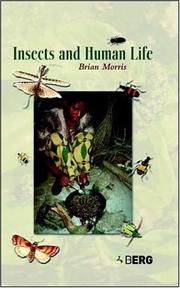| Listing 1 - 3 of 3 |
Sort by
|
Periodical
ISSN: 21559856 Year: 1994 Publisher: Annapolis, MD : Cary, NC : Entomological Society of America Oxford University Press
Abstract | Keywords | Export | Availability | Bookmark
 Loading...
Loading...Choose an application
- Reference Manager
- EndNote
- RefWorks (Direct export to RefWorks)
Publishes short reports on preliminary and routine screening tests for management of arthropods which may be harmful (e.g., pests and disease vectors of plants, animals and humans) or beneficial (e.g., parasitoids, predators and diseases of pests, honey bees, silkworm, etc.). Pest management methods reported in this publication may be those using chemical pesticides as well as other materials such as insect growth regulators, semiochemicals (pheromones, kairomones, etc.), traps, bio-control agents, pest-resistant plants and animals.
Arthropod pests --- Insecticides --- Beneficial insects --- Insecticides. --- Control --- Control. --- Economic entomology --- Entomology, Economic --- Insects, Beneficial --- Insects, Injurious and beneficial --- Useful insects --- Pesticides --- Insects --- Zoology, Economic --- Arthropoda --- Invertebrate pests

ISBN: 1859738478 1845200756 9781859738474 9781845209490 1845209494 9781474214957 1474214959 9781845200756 1282545523 9781282545526 9786612545528 6612545526 9781000189810 1000189813 9781003085713 1003085717 1000183181 9781000186697 1000186695 9781000183184 Year: 2004 Publisher: Oxford ; New York : Berg,
Abstract | Keywords | Export | Availability | Bookmark
 Loading...
Loading...Choose an application
- Reference Manager
- EndNote
- RefWorks (Direct export to RefWorks)
This pioneering book looks at the importance of insects to culture. While in the developed West a good deal of time and money may be spent trying to exterminate insects, in other cultures human-insect relations can be far more subtle and multi-faceted. Like animals, insects may be revered or reviled - and in some tribal communities insects may be the only source of food available. How people respond to, make use of, and relate to insects speaks volumes about their culture. In an effort to get to the bottom of our vexed relationship with the insect world, Brian Morris spent years in Malawi, a country where insects proliferate and people contend. In Malawi as in many tropical regions, insects have a profound impact on agriculture, the household, disease and medicine, and hence on oral literature, music, art, folklore, recreation and religion. Much of the complexity of human-insect relations rests on paradox: insects may represent the source of contagion, but they are also integral to many folk remedies for a wide range of illnesses. They may be at the root of catastrophic crop failure, but they can also be a form of sustenance.Weaving science with personal observations, Morris demonstrates a profound and intimate knowledge of virtually every aspect of human-insect relations. Not only is this book extraordinarily useful in terms of the more practical side of entomology, it also provides a wealth of information on the role of insects in cultural production. Malawian proverbs alone provide many such delightful examples - 'Bemberezi adziwa nyumba yake' ('The carpenter bee knows his own home'). This final volume in Morris' trilogy on Malawi's animal and insect worlds is certain to become a classic study of uncharted territory - the insect world that surrounds us and how we relate to it. Praise for The Power of Animals:Although based upon examination of a single culture, Morris incorporates ecological and anthropological concepts that expand this study of
Entomology --- Biodiversity --- Useful insects --- Food resources --- Human feeding --- Apiculture --- apiculture --- Stored products pests --- pests of plants --- Forest pests --- Vectors --- Social anthropology --- Heteroptera --- Apidae --- Termitidae --- Acrididae --- Noctuidae --- Formicidae --- Beneficial insects --- Insect pests --- Malawi --- Africa --- apiculture. --- Insects --- Hexapoda --- Insecta --- Pterygota --- Arthropoda --- Destructive insects --- Economic entomology --- Entomology, Economic --- Injurious insects --- Insects, Injurious and beneficial --- Arthropod pests --- Veterinary entomology --- Insects, Beneficial --- Zoology, Economic --- Ecology
Book
ISBN: 0262367572 0262367564 0262543206 Year: 2022 Publisher: Cambridge, Massachusetts : The MIT Press,
Abstract | Keywords | Export | Availability | Bookmark
 Loading...
Loading...Choose an application
- Reference Manager
- EndNote
- RefWorks (Direct export to RefWorks)
"An edited collection about the evolution of agriculture in humans and insects"--
Food & society --- Evolution --- Insects (entomology) --- Agriculture --- host-symbiont interactions --- domestication --- tragedy of the commons --- social evolution --- yield --- fungus-growing termites --- fungus-growing ants --- repression of competition --- kin selection --- mutualistic symbiosis --- fungus-farming ants --- evolution of agriculture --- attine ants --- Formicidae --- Attini --- Attina --- symbiosis --- coevolution --- mutualism --- Domestication. --- Insect rearing. --- Beneficial insects --- Crops --- Origin. --- Evolution. --- SOCIAL SCIENCE / Agriculture & Food (see also POLITICAL SCIENCE / Public Policy / Agriculture & Food Policy) --- SCIENCE / Life Sciences / Evolution --- SCIENCE / Life Sciences / Zoology / Entomology --- Crop evolution --- Evolution (Biology) --- Economic entomology --- Entomology, Economic --- Insects, Beneficial --- Insects, Injurious and beneficial --- Useful insects --- Insects --- Zoology, Economic --- Entomology --- Insect culture --- Mass rearing of insects --- Rearing of insects --- Small animal culture --- Animals, Domestication of --- Animal training --- Domestic animals --- Pets --- Origin of agriculture --- Agriculture, Prehistoric --- Domestication --- Cultures and culture media --- Rearing --- Social aspects --- History
| Listing 1 - 3 of 3 |
Sort by
|

 Search
Search Feedback
Feedback About UniCat
About UniCat  Help
Help News
News